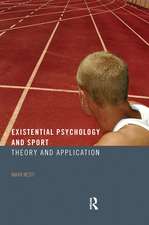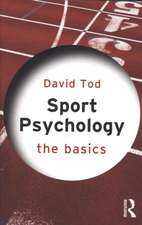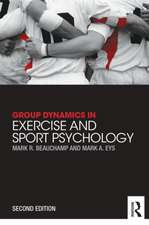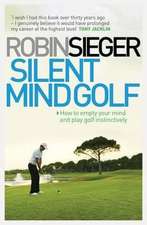The Psychology of Sub-Culture in Sport and Physical Activity: Critical perspectives: ISSP Key Issues in Sport and Exercise Psychology
Editat de Robert J. Schinke, Kerry R. McGannonen Limba Engleză Paperback – 20 aug 2014
This volume in the series focuses upon the sociocultural issues that challenge and often undermine participation, performance, and well-being in sports. Contributors address a number of important issues, such as exclusion, miscommunication, and ineffective practice in sport. The book extends the recent interest in culture within sport psychology by using a critical approach to highlight less mainstream sports such as martial arts, circus arts, extreme sports, and dance, and it will help sports participants and social scientists to gain an understanding of these marginalized sporting identities. By highlighting "subcultural" contexts, with their individual practices and values, it is hoped that the volume will promote the goal of achieving a more just, inclusive, and ethical sport psychology.
The Psychology of Sub-Culture in Sport and Physical Activity will be ideal reading for sport and exercise academics and practitioners, advanced students of applied sport psychology, and related fields such as sport science, critical studies, sociology, cultural studies and social anthropology.
| Toate formatele și edițiile | Preț | Express |
|---|---|---|
| Paperback (1) | 402.19 lei 6-8 săpt. | |
| Taylor & Francis – 20 aug 2014 | 402.19 lei 6-8 săpt. | |
| Hardback (1) | 1033.34 lei 6-8 săpt. | |
| Taylor & Francis – sep 2014 | 1033.34 lei 6-8 săpt. |
Preț: 402.19 lei
Nou
Puncte Express: 603
Preț estimativ în valută:
76.98€ • 80.81$ • 63.59£
76.98€ • 80.81$ • 63.59£
Carte tipărită la comandă
Livrare economică 30 ianuarie-13 februarie 25
Preluare comenzi: 021 569.72.76
Specificații
ISBN-13: 9781848721586
ISBN-10: 1848721587
Pagini: 226
Ilustrații: 3 black & white illustrations, 3 black & white line drawings
Dimensiuni: 156 x 234 x 12 mm
Greutate: 0.32 kg
Ediția:New.
Editura: Taylor & Francis
Colecția Routledge
Seria ISSP Key Issues in Sport and Exercise Psychology
Locul publicării:Oxford, United Kingdom
ISBN-10: 1848721587
Pagini: 226
Ilustrații: 3 black & white illustrations, 3 black & white line drawings
Dimensiuni: 156 x 234 x 12 mm
Greutate: 0.32 kg
Ediția:New.
Editura: Taylor & Francis
Colecția Routledge
Seria ISSP Key Issues in Sport and Exercise Psychology
Locul publicării:Oxford, United Kingdom
Cuprins
Section I: Sociocultural Dimensions of Inclusion/Exclusion in Sport 1. Introduction, Kerry R. McGannon & Robert J. Schinke 2. Applying a Critical Ecological Approach to the Issue of Athlete Abuse in Sport, Gretchen A. Kerr & Ashley E. Stirling 3. A Post-Structuralist Approach to Hazing in Sport, Jennifer J. Waldron 3. Gender Nonconformity, Sex Variation, and Sport, Vikki Krane 4. The Dark Side’ and Beyond: Narrative Inquiry in Professional Golf, Kitrina Douglas and David Carless 5. UltraEmpowering Women: A Feminist Analysis of the Ultramarathoning Culture, Cindra S. Kamphoff & Kelsey Timm Section II: Critiques of the Medical Model, Sport Culture and Sport Research 6. Disability, Sport, and Impaired Bodies: A Critical Approach, Brett Smith and Marie-Josee Perrier 7. A Few Good Men: Male Athlete Eating Disorders, Medical Supremacy and the Silencing of a Sporting Minority, Anthony Papthomas 7. Sport-related Concussion: Critical Issues Moving Forward, Anthony P. Kontos and Erin Reynolds Section III: Self-Reflection and Reflexivity in Sport Psychology Practice and Research 8. BE-KNOW-DO Model of Consulting: An Exploration of How Experiences with Soldiers Affected Me and How My Notions of Self Affected Soldiers’ Experiences, Shannon M. Baird 9. "Standing in the Question": Teaching a Critical Perspective to Developing Sport Psychology Consultants, Leslee A. Fisher and Alicia J. Johnson 10. Caged Quandaries: Mixed Martial Arts and the Politics of Research, Matthew A. Masucci and Ted M. Butryn 11. Confessions of the Disc: A Foucauldian Analysis of Ethics within Ultimate Frisbee, Hamish Crockett
Recenzii
'An interesting resource for a graduate seminar in sport psychology or sport studies, this book accomplishes the task of pushing research in the domain of sport psychology into areas that are typically not examined. The book will also help scholars interested in research that challenges the traditional positivistic approach and utilizes critical analysis in the area of sport psychology. Summing Up: Recommended. Graduate students, researchers, faculty, professionals.' - L.J. Burton, University of Connecticut, in CHOICE, April 2015
‘Human beings evolved to become an intensely social species. Our nervous systems (and the behaviours, thoughts, and emotions that arise from them) grow, get damaged, and become healed all within cultural and subcultural (e.g., family, sport, community) contexts. Mainstream sport and exercise psychology has traditionally had a primary focus on individuals, as if mental health, psychological disorders, and performance are athlete-centred issues. Schinke and McGannon, in this highly informative book, have assembled a fine group of authors who show us how socially and culturally bound our lives are and how no one (e.g., athlete, coach, researcher, practitioner) is an island, but rather we are situated on complex continents with many countries, regions, cities, and villages that all shape who we become’. - Mark Andersen, Professor of Sport Psychology, College of Sport and Exercise Science, Victoria University, Australia
‘The Psychology of Sub-Culture in Sport and Physical Activity presents a collection of articles on important and crucial issues untouched by conventional and traditional approaches in sport psychology. The use of critical narrative approaches to capture the cognitions, behavior and feelings of athletes, together with the utilization of reflections and reflexivity in practice, has encouraged me to think critically about my own research interests, methodologies, and practices . . . I strongly recommend the book to sport psychology researchers, practitioners, and students who wish to enhance their knowledge and skills, and use them for the benefit of those who need them.’ - Gershon Tenenbaum, Benjamin S. Bloom Professor of Educational Psychology, Florida State University, USA
‘Human beings evolved to become an intensely social species. Our nervous systems (and the behaviours, thoughts, and emotions that arise from them) grow, get damaged, and become healed all within cultural and subcultural (e.g., family, sport, community) contexts. Mainstream sport and exercise psychology has traditionally had a primary focus on individuals, as if mental health, psychological disorders, and performance are athlete-centred issues. Schinke and McGannon, in this highly informative book, have assembled a fine group of authors who show us how socially and culturally bound our lives are and how no one (e.g., athlete, coach, researcher, practitioner) is an island, but rather we are situated on complex continents with many countries, regions, cities, and villages that all shape who we become’. - Mark Andersen, Professor of Sport Psychology, College of Sport and Exercise Science, Victoria University, Australia
‘The Psychology of Sub-Culture in Sport and Physical Activity presents a collection of articles on important and crucial issues untouched by conventional and traditional approaches in sport psychology. The use of critical narrative approaches to capture the cognitions, behavior and feelings of athletes, together with the utilization of reflections and reflexivity in practice, has encouraged me to think critically about my own research interests, methodologies, and practices . . . I strongly recommend the book to sport psychology researchers, practitioners, and students who wish to enhance their knowledge and skills, and use them for the benefit of those who need them.’ - Gershon Tenenbaum, Benjamin S. Bloom Professor of Educational Psychology, Florida State University, USA
‘Human beings evolved to become an intensely social species. Our nervous systems (and the behaviours, thoughts, and emotions that arise from them) grow, get damaged, and become healed all within cultural and subcultural (e.g., family, sport, community) contexts. Mainstream sport and exercise psychology has traditionally had a primary focus on individuals, as if mental health, psychological disorders, and performance are athlete-centred issues. Schinke and McGannon, in this highly informative book, have assembled a fine group of authors who show us how socially and culturally bound our lives are and how no one (e.g., athlete, coach, researcher, practitioner) is an island, but rather we are situated on complex continents with many countries, regions, cities, and villages that all shape who we become’. - Mark Andersen, Professor of Sport Psychology, College of Sport and Exercise Science, Victoria University, Australia
‘The Psychology of Sub-Culture in Sport and Physical Activity presents a collection of articles on important and crucial issues untouched by conventional and traditional approaches in sport psychology. The use of critical narrative approaches to capture the cognitions, behavior and feelings of athletes, together with the utilization of reflections and reflexivity in practice, has encouraged me to think critically about my own research interests, methodologies, and practices . . . I strongly recommend the book to sport psychology researchers, practitioners, and students who wish to enhance their knowledge and skills, and use them for the benefit of those who need them.’ - Gershon Tenenbaum, Benjamin S. Bloom Professor of Educational Psychology, Florida State University, USA
‘Human beings evolved to become an intensely social species. Our nervous systems (and the behaviours, thoughts, and emotions that arise from them) grow, get damaged, and become healed all within cultural and subcultural (e.g., family, sport, community) contexts. Mainstream sport and exercise psychology has traditionally had a primary focus on individuals, as if mental health, psychological disorders, and performance are athlete-centred issues. Schinke and McGannon, in this highly informative book, have assembled a fine group of authors who show us how socially and culturally bound our lives are and how no one (e.g., athlete, coach, researcher, practitioner) is an island, but rather we are situated on complex continents with many countries, regions, cities, and villages that all shape who we become’. - Mark Andersen, Professor of Sport Psychology, College of Sport and Exercise Science, Victoria University, Australia
‘The Psychology of Sub-Culture in Sport and Physical Activity presents a collection of articles on important and crucial issues untouched by conventional and traditional approaches in sport psychology. The use of critical narrative approaches to capture the cognitions, behavior and feelings of athletes, together with the utilization of reflections and reflexivity in practice, has encouraged me to think critically about my own research interests, methodologies, and practices . . . I strongly recommend the book to sport psychology researchers, practitioners, and students who wish to enhance their knowledge and skills, and use them for the benefit of those who need them.’ - Gershon Tenenbaum, Benjamin S. Bloom Professor of Educational Psychology, Florida State University, USA
Descriere
This book extends the recent interest in culture within sport psychology to include less mainstream sports such as martial arts, circus arts, extreme sports, and dance. The chapters will help sports participants and social scientists gain an understanding of marginalized sporting identities, and challenge issues such as exclusion, miscommunication, and ineffective practice in sport. It will be ideal reading for sport and exercise academics and practitioners, advanced students of applied sport psychology, and in related fields such as sport science, critical studies, sociology, cultural studies and social anthropology.















